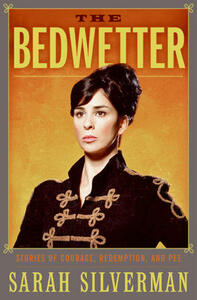Take a photo of a barcode or cover
Somewhat disjointed vignettes of Silverman's life, she tries a bit too hard at self deprecating humor. Disappointed it wasn't funnier.
I was surprised how emotionally vulnerable this book was, particularly in first third - like SHOCKED. Family tragedies, depression, and seriously struggling with bedwetting - I really was moved and teared up a couple times for sure.
The later 2/3rds are more what you expect when you think of Sarah Silverman - brash, honest, scatalogical, semi-offensive (deliberately) and hilarious. I thought many times, "Damn I have friends who would HATE this book" because Sarah Silverman DGAF about your feelings (and it's kind of refreshing, I gotta say.)
I laughed out loud a lot and now want to to watch her show and movie, which I somehow missed (goddamn child rearing is time consuming!) despite always being a fan.
The later 2/3rds are more what you expect when you think of Sarah Silverman - brash, honest, scatalogical, semi-offensive (deliberately) and hilarious. I thought many times, "Damn I have friends who would HATE this book" because Sarah Silverman DGAF about your feelings (and it's kind of refreshing, I gotta say.)
I laughed out loud a lot and now want to to watch her show and movie, which I somehow missed (goddamn child rearing is time consuming!) despite always being a fan.
Despite loving "Jesus Is Magic" and thinking "The Sarah Silverman Program" really wasn't worth the time, I somehow really wanted to read this book. If you're a young bedwetter who thinks the title is a joke (like everything else in this book, so I thought), the first third of this book is probably a really good thing. Otherwise, it's a straight-forward this-is-what-happened run-down of events in Silverman's life.
She writes of being a female comic trying to make it at SNL where she wrote and continually got rejected. Especially poignant is the bit where she gets signed, has her first lunch with the all-male cast of her writer peers who ask "What do you do then? Typing?"
She also writes of her family, especially where her father's voicemail is transcribed verbatim - including his New England dialect - and how overcoming her biggest obstacles in life has turned out.
There are some really big laughs throughout this book. I do love how Silverman turns prejudice and being ignorant on its head by acting the complete ignoramus, often by joking about "the unutterables", e.g. The Holocaust.
Sadly, some bits that are in the book aren't really interesting (to me), e.g. the chapter about her Emmys dress being a blue block. Sounds funny, perhaps, but really wasn't. I think.
All in all: interesting and funny, but some bits should have been left out and it should have been edited - at all points.
She writes of being a female comic trying to make it at SNL where she wrote and continually got rejected. Especially poignant is the bit where she gets signed, has her first lunch with the all-male cast of her writer peers who ask "What do you do then? Typing?"
She also writes of her family, especially where her father's voicemail is transcribed verbatim - including his New England dialect - and how overcoming her biggest obstacles in life has turned out.
There are some really big laughs throughout this book. I do love how Silverman turns prejudice and being ignorant on its head by acting the complete ignoramus, often by joking about "the unutterables", e.g. The Holocaust.
Sadly, some bits that are in the book aren't really interesting (to me), e.g. the chapter about her Emmys dress being a blue block. Sounds funny, perhaps, but really wasn't. I think.
All in all: interesting and funny, but some bits should have been left out and it should have been edited - at all points.
This was a hilarious, and a little too brief (ha!), overview of the comic's life. I think I enjoyed it simply because it was Sarah Silverman and not for any specific literary quality.
This book made me feel a lot better about the things I do and think. Sarah Silverman is excellent.
This review can also be found on my blog.
I don’t usually read a lot of memoirs or biographies, because reading about the exciting REAL lives that other people have lead isn’t really my cup of tea. Most of the time it just serves to remind me how mediocre my life has been thus far. I picked up this copy of The Bedwetter from the library because I’ve always been a fan of Sarah Silverman’s stand-up, and I thought it would be a hilarious read, much like Chelsea Handler’s books (which I adore).
The first half of this book is great. It details Sarah’s life as a young Jew, focusing primarily on how she wet the bed until she was in high school and how that affected her life as a comedian. It’s riddled with all sorts of lovely anecdotes about what it was like growing up as a child with a seriously embarrassing nighttime habit. Take, for example, Sarah’s fear of summer camp:
“And so, from six years old on, I was sent to sleepaway camp every summer. If you recall from several pages ago the terror I experienced in just one sleepover — now multiply that into a month’s worth of nights.
It’s not like my parents didn’t consider that — they gave my counselors special instructions to walk me to the bathroom in the middle of the night. And let me tell you, the thought of a sixteen-year-old kid knowing my problem was oh so comforting. Summer camp — salvation to both my mom and dad — was, for me, a camp-fiery hell. My teeth were bigger than my face, I was coated in hair, and I smelled like pee. Of course, most events in life are about context. Had my parents instead sent me to live in the Baboon Reserve at the Bronx Zoo, I would have been happy and confident, judging the others for flinging poo, and feeling downright aristocratic.” (25)
However, its’s the second half of the book, where Sarah describes her transition from awkward youth to famous comedian where the book lost me. Instead of talking about the events in her life in a nice, linear manner, Sarah starts to jump around in her writing. It was hard for me to keep track of what year we were in, since there weren’t many mentions of it. A lot of the sections of the book devolved into telling funny stories about experiences she’s had with her friends more than about her life. It was disappointing for me, because I found myself really enjoying the first part of the book, and then torn between finishing the book or just turning it back into the library without getting to the end.
While it’s true that most of the situations Sarah chooses to write about in The Bedwetter are very entertaining, I wanted more information about her personal life than about all the penis jokes she and her fellow writers tell during the production of The Sarah Silverman Programme.
I also felt that there were a lot of times where Sarah was using this book as a means to clear her name from some of the bad publicity she’s gotten over the years. Some of them are funny and interesting, such as the debacle with her dress from the 2009 Emmys. Other times, I feel she is trying to prove herself the victim instead of the antagonist in certain situations, such as when she used an Asian-American slur on Conan O’Brien’s show. On the one hand, I understand how, given her philosophy about her comedy, she didn’t think it was offensive at all. But on the other hand, there is a time and place for everything, and perhaps some of the hate mail she received wasn’t unjustified (as she tried to make it seem like it was).
While I have said a lot of negative things about the last half of the book, Sarah does tell some rather funny stories about her life, and she even includes a “midword” (kind of life a foreward or afterward, but in the middle of the book, get it??!) that was quite enjoyable to read. I feel, though, as if these things weren’t enough to redeem the book in my eyes, and I really wanted to get to know more of Sarah instead of listen to more of her jokes.
tl;dr: If you’re a fan of Sarah Silverman’s work, it might be worth a read, just to get more of the same. If you’re really hoping to learn more about her as a person, then you might want to look elsewhere.
I don’t usually read a lot of memoirs or biographies, because reading about the exciting REAL lives that other people have lead isn’t really my cup of tea. Most of the time it just serves to remind me how mediocre my life has been thus far. I picked up this copy of The Bedwetter from the library because I’ve always been a fan of Sarah Silverman’s stand-up, and I thought it would be a hilarious read, much like Chelsea Handler’s books (which I adore).
The first half of this book is great. It details Sarah’s life as a young Jew, focusing primarily on how she wet the bed until she was in high school and how that affected her life as a comedian. It’s riddled with all sorts of lovely anecdotes about what it was like growing up as a child with a seriously embarrassing nighttime habit. Take, for example, Sarah’s fear of summer camp:
“And so, from six years old on, I was sent to sleepaway camp every summer. If you recall from several pages ago the terror I experienced in just one sleepover — now multiply that into a month’s worth of nights.
It’s not like my parents didn’t consider that — they gave my counselors special instructions to walk me to the bathroom in the middle of the night. And let me tell you, the thought of a sixteen-year-old kid knowing my problem was oh so comforting. Summer camp — salvation to both my mom and dad — was, for me, a camp-fiery hell. My teeth were bigger than my face, I was coated in hair, and I smelled like pee. Of course, most events in life are about context. Had my parents instead sent me to live in the Baboon Reserve at the Bronx Zoo, I would have been happy and confident, judging the others for flinging poo, and feeling downright aristocratic.” (25)
However, its’s the second half of the book, where Sarah describes her transition from awkward youth to famous comedian where the book lost me. Instead of talking about the events in her life in a nice, linear manner, Sarah starts to jump around in her writing. It was hard for me to keep track of what year we were in, since there weren’t many mentions of it. A lot of the sections of the book devolved into telling funny stories about experiences she’s had with her friends more than about her life. It was disappointing for me, because I found myself really enjoying the first part of the book, and then torn between finishing the book or just turning it back into the library without getting to the end.
While it’s true that most of the situations Sarah chooses to write about in The Bedwetter are very entertaining, I wanted more information about her personal life than about all the penis jokes she and her fellow writers tell during the production of The Sarah Silverman Programme.
I also felt that there were a lot of times where Sarah was using this book as a means to clear her name from some of the bad publicity she’s gotten over the years. Some of them are funny and interesting, such as the debacle with her dress from the 2009 Emmys. Other times, I feel she is trying to prove herself the victim instead of the antagonist in certain situations, such as when she used an Asian-American slur on Conan O’Brien’s show. On the one hand, I understand how, given her philosophy about her comedy, she didn’t think it was offensive at all. But on the other hand, there is a time and place for everything, and perhaps some of the hate mail she received wasn’t unjustified (as she tried to make it seem like it was).
While I have said a lot of negative things about the last half of the book, Sarah does tell some rather funny stories about her life, and she even includes a “midword” (kind of life a foreward or afterward, but in the middle of the book, get it??!) that was quite enjoyable to read. I feel, though, as if these things weren’t enough to redeem the book in my eyes, and I really wanted to get to know more of Sarah instead of listen to more of her jokes.
tl;dr: If you’re a fan of Sarah Silverman’s work, it might be worth a read, just to get more of the same. If you’re really hoping to learn more about her as a person, then you might want to look elsewhere.
Less disgusting than I was expecting (although I like that kind of humor), I came away with a better understanding of who Sarah is. A good listen.
The part about growing up was funny and loving. Fine for skimming while on the desk.







